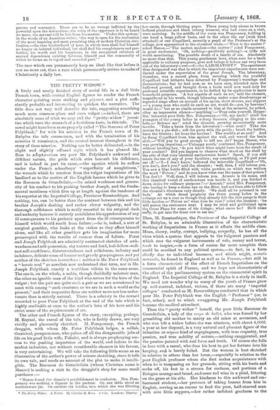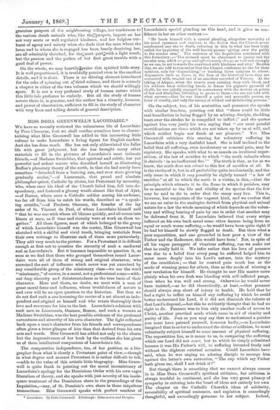THE PRETTY WIDOW.*
A lively and neatly finished story of social life in a dull little French town, with central English figures to render the French character-painting more striking and piquant, and a plot suffi- ciently probable and interesting to quicken the narrative. The title does not very well describe the tale, suggesting something much more common-place and even vulgar ;—indeed, there are absolutely none of what we may call the "pretty-widow " jocosi- ties which turn the stomach of a fastidious taste, in this tale. The novel might have been more properly called "The Sorrows of Peter Polyblank," for with his miseries in the French town of St. Babylas the tale commences, and with the termination of his miseries it terminates, and the central interest throughout is the story of these miseries. Nothing can be better delineated,—in the alight and slightly offhand style which it has pleased Mr. Ross to adOpt,g—than are poor Mr. Polyblank's awkward and diffident nature, the pride which stirs beneath his diffidence,
and is indeed in part its cause,—the agonies which he suffers under the French schoolboys' " superfluity of naughtiness," the wounds which he receives from the vulgar imputations of his landlord as to the motive of the English lessons which he gives to the Baroness de Grandvilain,—the mixed weakness and genero- sity of his conduct to his pushing brother Joseph, and the funda- mental manliness which fir up at length against the insolence of his superior at the Imperial College, Proviseur Roustoubique. And nothing, too, can be better than the contrast between this and his brother Joseph's dashing and rather clever vulgarity, and the thorough selfishness which is really essential to his surgical dash and audacity because it entirely annihilates his apprehension of any ill consequences to his patients apart from the ill consequences to himself which would result from failure ;—he is, indeed, a sort of surgical gambler, who looks at the stakes as they affect himself alone, and like all other gamblers gets his imagination far more preoccupied with the results of success than of failure. Peter and Joseph Polyblank are admirably contrasted sketches of awk- wardness and self-possession, shy reserve and loud, hail-fellow-well- met self -confidence, disinterestedness and selfishness, industry and indolence, delicate sense of honour and greedy graspiugness. and yet neither of the sketches is overdone ; neither is Mr. Peter Polyblank a " heroic soul " as novelists now understand that term, nor is Mr. Joseph Polyblank exactly a worthless villain in the same sense. The one is, on the whole, a noble, though decidedly unheroic man, the other an ignoble man of the kind who serves for the hero of the vulgar ; but the pair are quite such a pair as we are accustomed to meet with among " such creatures as we are in such a world as the present," and their respective fates are neither more nor less unfor- tunate than is strictly natural. There is a sobriety in the reward accorded to poor Peter Polyblank at the end of the tale which is highly creditable at once to the author's love of his hero and his strict sense of the requirements of art.
The other and French figures of the story, excepting, perhaps, M. Reyna], the rascal of the tale, who is feebly drawn, are very vividly and pleasantly sketched. M. Pomponney, the French druggist, with whom Mr. Peter Polyblauk lodges, a selfish, theatrical, pompous man, who palms off all the disagreeable jobs of life on his good little wife, Felicite, and is always prophesying suc- cess to the pushing impostures of the world, and failure to the modest industries, not without considerable chances in his favour, is very entertaining. We will take the following little scene as an illustration of the author's power of minute sketching, since it tells its own tale, and needs no account of the plot to make it intelli- gible. The Baroness de Grandvilain (whose Christian name is Manon) is making a visit to the druggist's shop for some small purchases :-
"Manon found the chemist's establishment in confusion. Mrs. Pom- ponney was making a liqueur in the parlour. On one table stood an earthenware jar. On another six bottles, into which she was filtering
* The Pretty Widow. A Novel. By Charles H. Boss. 2 vole. London: Tinsley.
her cassis, through blotting paper. Three young lady nieces in brown holland pinafores and black coburg trousers, who had come on a visit, were assisting. In the middle of the room was Pomponney, holding in one hand a large yellow basin, and in the other the ear (with head, attached) of one Coquillard, recently a pupil of the Professor's at the college, now apprenticed to the chemical trade.= What is the matter ?' asked Manon.—' The matter, madam—the matter !' cried Pomponney, in great excitement. 'Oh, nothing—positively nothing !—a trifle not worth mentioning. The possible death of a family of six. Absolutely no more than that. This young gentleman here, when sent for a basin applicable to culinary purposes, goes and brings it before our very faces out of the laboratory—out—of—the LABORATORY ?' The apartment thus designated was that in which the important experiments were con- ducted under the supervision of the great Joseph. The laboratory, therefore, was a sacred place, from entering which the youthful Coquillard had hitherto been deterred by Pomponney's warnings and denunciations ; but he had now, as we have seen, intruded upon the hallowed ground, and brought down a basin until now used only for profound scientific experiments, to be defiled by its application to mere household purposes. 'A boy capable of such an act,' said the chemist, magnificent in his wrath, though labouring under some disadvantage as • regarded stage effect on account of his apron, short sleeves, and slippers a young man who could do such an act, would do—yes, by heavens ! would do—' but as no simile occurred to him at the moment, he added, after an impressive silence—'anything.'—'Pray calm yourself, Hyppo- lite,' intreated poor little Mrs. Pomponney.—' Oh, my uncle!' cried the youngest of tho young ladies in coburg trousers, clinging to his coat- tails.—' Release me !' cried the chemist, growing momentarily more terrific. Take a basin from the laboratory !—what next? Take the mortar for a pie-dish ; roll the paste with the pestle ; break the bottles, burn the blisters ; lot loose the leeches ! The world's at an end !' And he flung Coquillard from him against the wall, and waved the basin aloft.—' Will you be good enough to tell me, sir?' began Manon, who was growing impatient.—' Unhappy youth,' continued Mrs. Pomponney, without heeding her, do you know what might have been tho result of your conduct? Did you happen to observe what stood on the shelf by the side of that very identical earthenware basin ? Speak, if you still retain the use of any of your faculties ; say something, or rll pull your ear off.'—` I—I don't know,' bellowed the miserable Coquillard.—' Oh, you don't, don't you ?' said the chemist ; well, then, I will inform you. You saw a blue bottle filled with white powder, on which was written the word " Poison ;" and do you know what was the name of that poison? You don't ? Well, then, I will inform you. Arsenic is its name, and this identical vessel of earthenware was beside it, and you fetched it down stairs for culinary purposes Arsenic !' cried Mrs. Pomponney, who having to keep a sharp eye on the filter, had not been able to follow the chemist's discourse very closely. 'We ;hall all be poisoned in our beds.' At which dread prophecy the three young ladies in the coburgs set up a roar as though they already felt the first pangs in their little insides.—`Poison us! what does he care ?' cried the chemist : he will poison the customers next. I may be tried and guillotined upon the Great Place for some of his doings ; what cares he ? He'll come early, to get into the front row to see me."
Then, M. Ronstoubique, the Proviseur of the Imperial College of St. Babylas, is an admirable illustration of the characteristic working of Imperialism in France as it affects the middle class. Mean, showy, crafty, corrupt, bullying, cow.ardly, he has all the vices which a system that appeals to the vulgarest passions and which uses the vulgarest instruments of rule, money and terror, teal to inspire,—in a form of course far more complete than could be ascribed to any political system,—in fact, in a form chiefly due to individual baseness, and which might, =tails mutandis, be found in England as well as in France,—but still in a form characteristic of the effect of French Imperialism ou the commercial spirit of France, and we hope not characteristic of the effect of the parliamentary system on the commercial spirit in England. The Imperial College of St. Babylas is a study in itself. We need not wonder why so many of the youth of France grow up self-centred, indolent, vicious, if there are many ' imperial colleges' conducted as M. Roustonbique conducted that in which poor Mr. Peter Polyblank was the English " Professor" (or, in fact, usher), and to which swaggering Mr. Joseph Polyblank
b ecame the medical attendant.
Then the "pretty widow" herself, the poor little Baroness de Grandvilain, a lady of the corps de ballet, who was forced by her grumbling old mother to marry an old miser at seventeen, and who was left a widow before she was nineteen, with about 4,0001. a year at her disposal, is a very natural and pleasant figure of the infantine or mignon kind of engagingness, with true coquetry, true passion, and true nobility of nature,—nothing exaggerated, and the passion painted with real force and truth. Of course she falls in love with a rascal, who does his best to get her fortune into his keeping, any,{ is barely foiled. But the woman is best sketched in relation to others than her lover,—especially in relation to the poor English professor whom she first makes acquaintance with when he is trespassing on her -grounds, sitting with his boots and socks off, his feet in a stream fot coolness, and portions of a Bologna sausage and bread, and some red wine in a phial, littering on the grass at his side. Her kindness to this awkward and em- barrassed student,—her pretence of taking lessons from him in English, serving as an excuse to feed the poor, half-starved man with nice little suppers,—her rather indolent goodness to the
graceless paupers of the neighbouring village, her tenderness to the various dumb animals who, like the:paupers, impose on her not very acute or well regulated kindness, and her helpless out- burst of agony and misery when she finds that the man whom she loves and to whom she is engaged has been basely deceiving her, are all admirably sketched, for thelmost put:with a light touch, but the passion and the pathos of her first great trouble with a good deal of power.
On the whole, we may heartilyipraise this spirited little story. It is well proportioned, it is truthfully painted even in the smallest details, and it is short. There is no diluting element introduced for the sake of spinning out a: third volume, and there is scarcely a chapter in either of the two volumes which we should willingly spare. It is not a very profound study of human nature which this little tale professes to embody. But all the study of human nature there is, is genuine, and the author has a vivacity, humour, and power of observation, sufficient to fill in the study of character with very keen and telling details of general description.









































 Previous page
Previous page